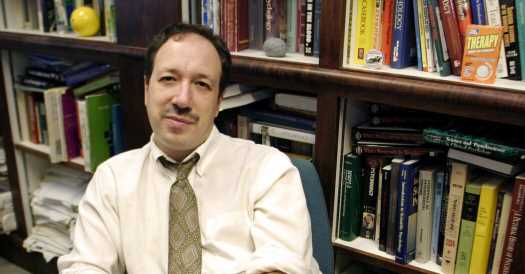Scott Lilienfeld, an expert in personality disorders who repeatedly disturbed the order in his own field, questioning the science behind many of psychology’s conceits, popular therapies and prized tools, died on Sept. 30 at his home in Atlanta. He was 59.
The cause was pancreatic cancer, his wife, Candice Basterfield, said.
Dr. Lilienfeld’s career, most of it spent at Emory University in Atlanta, proceeded on two tracks: one that sought to deepen the understanding of so-called psychopathic behavior, the other to expose the many faces of pseudoscience in psychology.
Psychopathy is characterized by superficial charm, grandiosity, pathological lying and a lack of empathy. Descriptions of the syndrome were rooted in research in the criminal justice system, where psychopaths often end up. In the early 1990s, Dr. Lilienfeld worked to deepen and clarify the definition.
In a series of papers, he anchored a team of psychologists who identified three underlying personality features that psychopaths share, whether they commit illegal acts or not: fearless dominance, meanness and impulsivity. The psychopath does what he or she wants, without anxiety, regret or regard for the suffering of others.
“When you have these three systems interacting, it’s a bad brew, and it creates the substrate for what can become psychopathy,” said Mark F. Lenzenweger, a professor of psychology at the State University of New York at Binghamton. “This was Scott’s great contribution: He helped change the thinking about psychopathy, in a profound way, by focusing on aspects of personality, rather than on a list of bad behaviors.”
Dr. Lilienfeld’s parallel career encompassed clinical psychology and aimed to shake it free of empty theorizing, softheadedness and bad practice. In the late 1990s and early 2000s, he led a loose group of researchers who began to question the validity of some of the field’s favored constructs, like repressed memories of abuse and multiple personality disorder.
The Rorschach inkblot test took a direct hit as largely unreliable. The group also attacked treatments including psychological debriefing and eye movement desensitization and reprocessing, or E.M.D.R., both of which are used for trauma victims.
“Many practitioners, because they don’t keep up with the scientific literature, may be using suboptimal and, in some cases, even dangerous treatments,” Dr. Lilienfeld told The New York Times in 2004.
Many therapists bristled at the critiques, seeing a strain of zealotry or scientific purism that ignored the messy, idiosyncratic demands of treating actual human beings.
Undeterred, Dr. Lilienfeld founded The Scientific Review of Mental Health Practice, a journal “devoted exclusively to distinguishing scientifically supported claims from scientifically unsupported claims in clinical psychology, psychiatry and social work.”
Dr. Lilienfeld became a self-appointed public ombudsman, an impish scientific conscience, at once easygoing, formidable and precise in his critiques. He made himself eminently accessible to students, reporters and even rivals. He would pick up his phone on the first ring, as if expecting the call.
“He just believed that was all part of his job,” Ms. Basterfield said.
He also received blowback when he touched a nerve. In 2017, he published a critique of the scientific basis for microaggressions, described as subtle and often unwitting snubs of marginalized groups. (For instance, a white teacher might say to a student of color, “My, this essay is so articulate!”) Dr. Lilienfeld argued that the concept of microaggressions was subjective by nature, difficult to define precisely, and did not take into account the motives of the presumed offender, or the perceptions of the purported victim. What one recipient of the feedback might consider injustice, another might regard as a compliment.
The nasty mail rolled in, from many corners of academia, Dr. Lilienfeld told colleagues.
“There was no one like him in this field,” said Steven Jay Lynn, a psychology professor at Binghamton and a longtime collaborator. “He just had this abiding faith that science could better us, better humankind; he saw his championing as an opportunity to make a difference in the world. He enjoyed stepping into controversial areas, it’s true, but the motives were positive.”
Scott Owen Lilienfeld was born on Dec. 23, 1960, in Queens, the third child of Ralph and Thelma (Farber) Lilienfeld. His father was a radiologist, his mother a homemaker.
He attended Cornell University, earning a degree in psychology in 1982, and completed a Ph.D. in 1990 at the University of Minnesota. He taught at the State University of New York at Albany before joining the faculty at Emory in 1994.
He married Lori Marino in 1992; they divorced in 2004. He married Ms. Basterfield in 2016. In addition to her, he is survived by a sister, Laura.
Dr. Lilienfeld’s fascination with psychology seemed infinite. He published continually, and on topics of wide general interest, among them conspiracy theories, psychology papers written by celebrities, hypnosis and psychopathy in presidents. His collected work, much of it written with Dr. Lynn, included “50 Great Myths of Popular Psychology (2009),” “Science and Pseudoscience in Clinical Psychology (2014)” and several other books.
In spirit and practice, Dr. Lilienfeld’s mission presaged a larger and more recent self-examination within psychological research, known as the replication crisis, in which researchers have found that many accepted findings do not stand up when retested.
“Much like a dysfunctional family that avoids addressing uncomfortable issues out of fear of opening up a can of worms,” Dr. Lilienfeld wrote in a 2017 paper, “we have put off this difficult discussion for too long. But it will be needed if we ever hope to realize psychological science’s considerable potential.”
Source: Read Full Article
